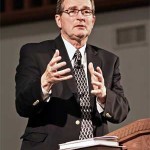 The Gospel of Sovereign Grace – Joel Beeke
The Gospel of Sovereign Grace – Joel Beeke
This excerpt is taken from Living for God’s Glory: An Introduction to Calvinism by Joel Beeke.
One New Testament book that especially emphasizes God’s astounding sovereign grace is Paul’s letter to the Romans. According to Paul, this grace makes both Jew and Gentile co-heirs of God’s kingdom with faithful Abraham (Rom. 4:16). It establishes peace between God and sinners who are His enemies (Rom. 5:2). Since only this grace is stronger than the forces of sin, it brings genuine and lasting freedom from sin’s dominion (Rom. 5:20-21; 6:14). Divine grace equips Christian men and women with varied gifts to serve in the church of God (Rom. 12:6). This grace ultimately will conquer death and is the sure harbinger of eternal life for all who receive it (Rom. 5:20-21), for it is a grace that reaches back into the aeons before the creation of time and, without respect to human merit, chooses men and women for salvation (Rom. 11:5-6).
This idea that salvation owes everything to God’s grace is the overarching theme not just in Romans but in all of Paul’s epistles. For example, Paul begins his letter to the Philippians with a prayer for the church in which he says, “He which hath begun a good work in you will perform it until the day of Jesus Christ” (1:6). “God’s seed will come to God’s harvest,” Samuel Rutherford writes. Salvation is neither our earning nor our doing. That is why Paul prayed with joy and thanksgiving every time he remembered the Philippians. If man had begun the work of salvation, was continuing it, and had to complete it, Paul’s praise would be silenced. But because salvation flows from a divine work that persists day by day despite man’s struggles and setbacks, a work that most certainly will be perfected in the great day, everything is to the praise of the glory of the triune God. This is why Paul thanks God for all the doctrines of grace and is moved to joy whenever he thinks of believers drawn to Christ. By clinging to God’s grace, we, like Paul, can be joyful Christians who victoriously confess, “If God be for us, who can be against us?” (Rom. 8:31).
Grace calls us (Gal. 1:15), regenerates us (Titus 3:5), justifies us (Rom. 3:24), sanctifies us (Heb. 13:20-21), and preserves us (1 Peter 1:3-5). We need grace to forgive us, to return us to God, to heal our broken hearts, and to strengthen us in times of trouble and spiritual warfare. Only by God’s free, sovereign grace can we have a saving relationship with Him. Only through grace can we be called to conversion (Eph. 2:8-10), holiness (2 Peter 3:18), service (Phil. 2:12-13), or suffering (2 Cor. 1:12).
Sovereign grace crushes our pride. It shames us and humbles us. We want to be the subjects, not the objects, of salvation. We want to be active, not passive, in the process. We resist the truth that God alone is the author and finisher of our faith. By nature, we rebel against sovereign grace, but God knows how to break our rebellion and make us friends of this grand doctrine. When God teaches sinners that their very core is depraved, sovereign grace becomes the most encouraging doctrine possible.
From election to glorification, grace reigns in splendid isolation. John 1:16 says we receive “grace for grace,” which literally means “grace facing or laminated to grace.” Grace follows grace in our lives as waves follow one another to the shore. Grace is the divine principle on which God saves us; it is the divine provision in the person and work of Jesus Christ; it is the divine prerogative manifesting itself in election, calling, and regeneration; and it is the divine power enabling us freely to embrace Christ so that we might live, suffer, and even die for His sake and be preserved in Him for eternity.
Calvinists understand that, without sovereign grace, everyone would be eternally lost. Salvation is all of grace and all of God. Life must come from God before the sinner can arise from the grave.
Free grace cries out for expression in the church today. Human decisions, crowd manipulations, and altar calls will not produce genuine converts. Only the old-fashioned gospel of sovereign grace will capture and transform sinners by the power of the Word and Spirit of God.
